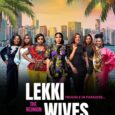Half of a Yellow Sun
Onyeka Onwenu, Gloria Young, Hakeem Kae Kazeem, Tina Mba, Wale Ojo, O.C. Ukeje, Genevieve Nnaji and Zack Orji alongside Chiwetel Ejiofor, Anika Noni Rose and Thandie Newton
Olanna and Kainene are glamorous twins from a wealthy Nigerian family. Upon returning to a privileged city life in newly independent 1960s Nigeria after their expensive English education, the two women make very different choices. Olanna shocks her family by going to live with her lover, the "revolutionary professor" Odenigbo (Chiwetel Ejiofor) and his devoted houseboy Ugwu in the dusty university town of Nsukka; Kainene turns out to be a fiercely successful businesswoman when she takes over the family interests, and surprises even herself when she falls in love with Richard, an English writer.
"My life will change only if I want it to" - Gloria Anozie Young
Biyi Bandele
Andrea Calderwood
Biyi Bandele
2014
A nice attempt at adapting an incredible book.
From Jane Eyre to Wuthering Heights and even Harry Potter to Twilight, there is never a movie adaptation of a book that does not seem to suffer from what I shall hence refer as “not as good as the book syndrome” and Biyi Bandele’s adaptation of Half of a Yellow Sun (HOAYS) is no different.
Half of a Yellow Sun the movie is the adaptation of Chimamanda Ngozi Adichie’s award winning novel of the same name that tells the story of two educated Igbo Nigerians – Odenigbo and Olanma who meet and fall in love in the face of a turbulent post-colonial Nigeria. It follows their love story through the riots between easterners and northerners, the secession and the Biafran war.
Watching the movie it is easy to spot the charm of the book and what worked. HOAYS the book created such a strong pull because of the story. A majority of its appeal arose from the storyteller’s character creations, from the atmosphere she imagined, the mood she set, the feelings she put in these characters and how she built on it.
HOAYS the movie, however, takes a different approach. Fifteen minutes or less into the movie it becomes evident that the filmmaker has no intent on making any sort of attempt to follow the book’s format. The movie plunges right into the “quasi middle” of the story right before Olanma moves to Nsukka and resumes from that. Fans of the novel might miss many things like the introductions of the “revolutionary and his gang of drunkards”, Kainene’s emotional ups and downs, Ugwu’s acclimation process amongst many things.
But Half of a Yellow Sun the movie is not Half of a Yellow Sun the book. To truly enjoy the movie and see it objectively one must leave behind all prior expectations. Even though the movie does not recreate the emotions of the book it creates its own emotion. The question however is whether the audience will be receptive to this sort of emotion versus that of the book. The emotional aspect of the book is built by a genuine storyline, empathy and a feeling of oneness with the character, and the movie relies more on external motivators.
The emotions in the movie are twenty percent created by the actors, ten percent from the setting and seventy percent from the music. The music part I do not quite mind because it was impressive and it was efficient in serving its purpose. A filmmaker once told me though, and I paraphrase, that “it’s only a lazy filmmaker who depends on music to build emotion” and I can not deny that that occurred in this movie – even though I didn’t mind it.
There are arguments upon arguments about the cast of this movie from the choice of the male and female lead to why Nigerians are only playing supporting roles. But after seeing the wealth of emotion displayed from Thandie and Chiwetel, I cannot argue with the choice of actors. The actors in this movie were the force that drove this movie, and a special commendation for the actor that played Ugwu. There was something endearing about him from start to finish that at the end I only cried when he returned – or maybe it was the music again?
The movie builds on amazing sets, actors, supporting actors and music but it is not without its faults. For one it would have been nice if Thandie could have demonstrated a bit more/a slight degree of command over the Igbo tongue and if we could have gotten more background on the characters it would have been monumentally better. But ofcourse, there is only so much a filmmaker can do in 2 hours.









I never read the book but I was quite disappointed with the movie. No question, it’s beautiful picture. Gorgeous sets, great actors, outstanding cinematography but they don’t make a unified great whole. I wondered in the end what the film was about. It went too fast in the beginning for me to connect with the lead character.
Hmm… I guess I never considered the perspective of someone who is completely new to the storyline. For those who had read it it was more of seeing their imaginations come alive. Then I guess for you it just wasn’t cohesive?
I’ve read this book so many times, and so I had great expectations for the movie, I expected the events to unfold in an amazing way, but my expectations were cut short. The events happened soo fast and it felt like Child’s play. Chiwetel Ejiofor is the stand out performance for me, John Boyega did well also, Thandie Newton And Anika Noni Rose were just there. I wish there was an indepth analysis of this book before it was adapted as a movie!
I saw it and it was kinda nyc. I haven’t read d book tho